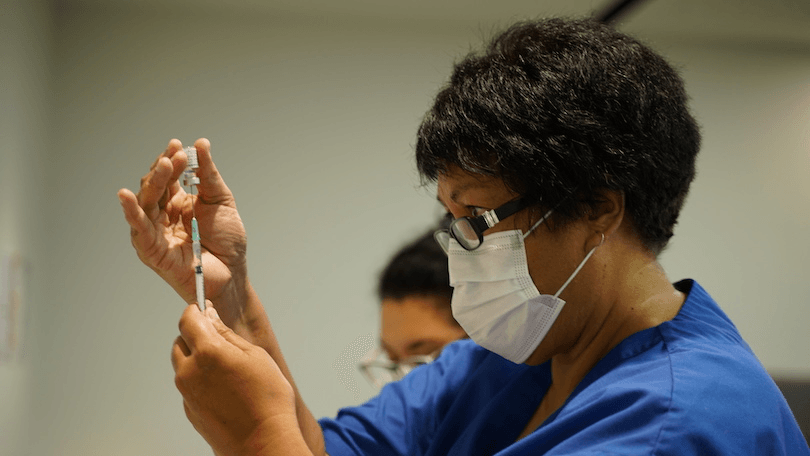The national vaccination roll-out begins today. Might the reluctant have a change of mind? Here’s what new Stickybeak polling for The Spinoff tells us.
Vaccination is under way in New Zealand, with the first doses going to the small group that will be conducting the vaccinations yesterday and the showpiece launch of the roll-out taking place this afternoon, when workers at the Jet Park quarantine facility in Auckland will be the first border workers to get the good jab.
As part of our eighth survey since the Covid-19 pandemic began, we asked New Zealanders: “If a medically approved vaccine was available not at no cost to you, would you take it?”
Just over half of respondents, or 53%, answered yes; 25% answered no, while 22% said they were unsure.
The results suggest a growing scepticism about the vaccine, despite its safety having been confirmed by MedSafe and numerous international studies. In our poll from May last year, as New Zealand emerged from its first and lengthiest lockdown, 65% of those polled said they would aim to get vaccinated “if and when a vaccine to Covid-19 becomes available”. Fifteen per cent said no, and 20% professed to be unsure.
This week’s poll showed a higher willingness to be vaccinated among those who live in Auckland, with 57% saying they would choose to be vaccinated, and 23% saying nah.
We put another question to those who answered either “no” or “unsure”.
We asked: “Are you just ‘hesitant’ and awaiting more information, or more strongly opposed to vaccines in general?” Of that group, 30% answered “strongly opposed” and 70% were awaiting more information. Clearly, the task ahead for the government is to articulate the science-based case for inoculation.
A survey by Horizon for the Ministry of Health, released on Wednesday but conducted in December of last year, found 69% were prepared to receive a “well-tested and approved” Covid-19 vaccine.
As far as refusals were concerned, the result was similar: 24% of respondents “indicated that they would be unlikely to have a Covid-19 vaccine if offered”, while 16% said they would “not accept an offered vaccine”.
Horizon’s polling also indicated that Pasifika and Māori “have less confidence in the safety and quality of the vaccine and of its protection”.
The ministry findings also indicated that “21% of participants said they would not take a Covid-19 vaccine if a social media post or video alarmed them or was opposed to Covid-19 vaccines and looked credible”.
The first delivery of the Pfizer vaccine, which arrived in New Zealand on Monday, includes 60,000 doses, enough for 30,000 people to get the required double-serving. It is expected that all 12,000 frontline workers will have received a first dose within two or three weeks.
Announcing the timetable eight days ago, Jacinda Ardern said border workers’ families would be next in line. “Health care and essential workers and those most at risk from Covid-19 will follow in quarter two, before vaccination of the wider population in the second half of the year,” she said.
Everyone will have had a chance to get the vaccine, it is expected, within about a year.
About the study
Respondents were self-selecting participants, recruited via Facebook and Instagram.
A total of n=601 sample was achieved of adults in New Zealand, with 208 of those in Auckland.
Results in this report are weighted by age, gender and region to statistics from the 2018 Census.
For a random sample of this size and after accounting for weighting the maximum sampling error (using 95% confidence) is approximately ±4%.
The study went into the field on Tuesday February 16 and was completed on Wednesday February 17.
Numbers are rounded, so will not always add to 100%.
About Stickybeak
Stickybeak is a New Zealand startup launched globally last June, that uses chatbots to make quantitative market research more conversational and therefore less boring and even fun for respondents. Unlike conventional research which uses panels of professional paid responders, Stickybeak recruits unique respondents fresh for each survey via social media.





